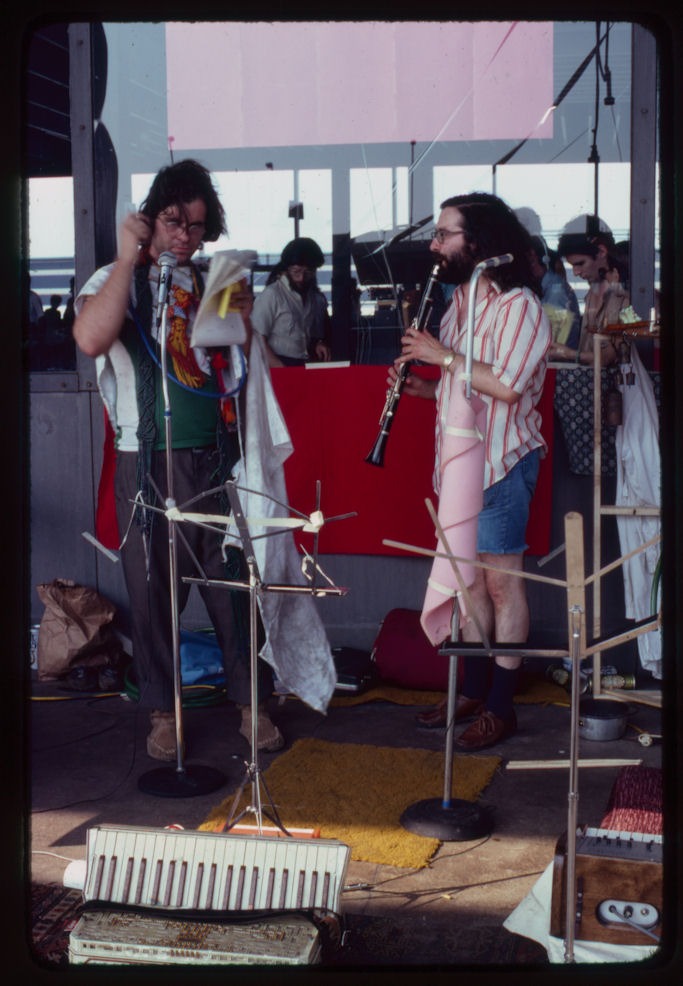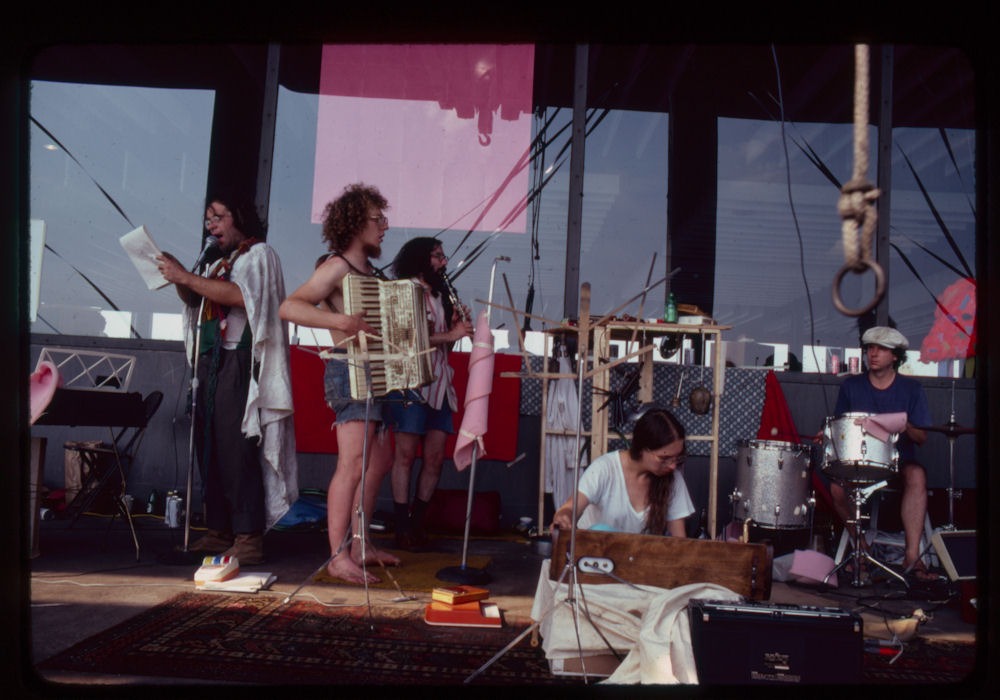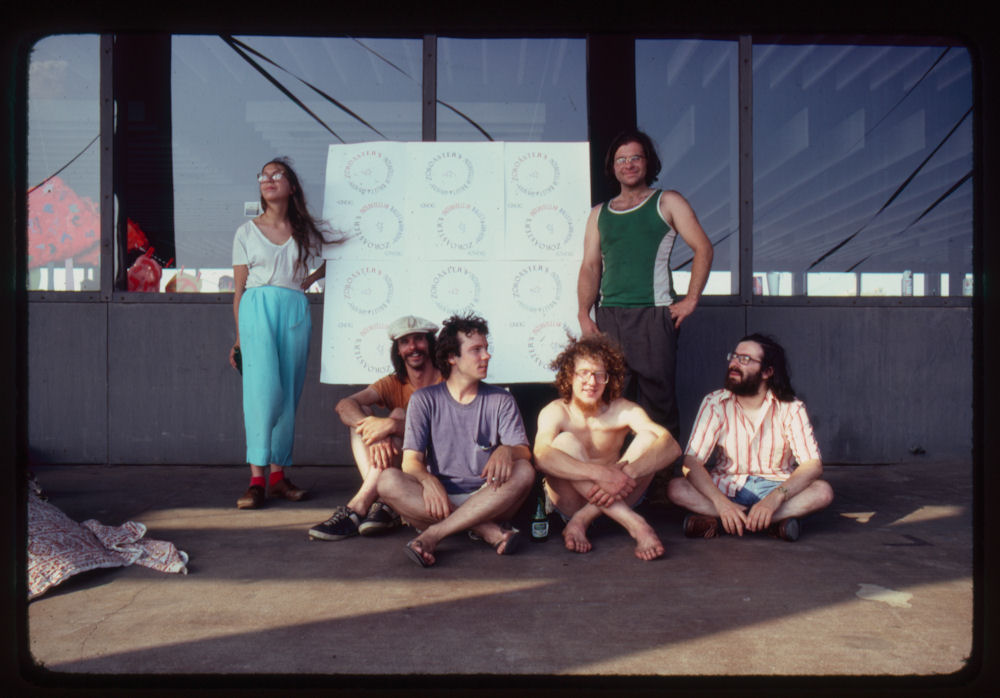What follows are excerpts from a series of weekly interviews by Jane Noyes with Julia Ferrari, from late 2013 thru July of 2014, about Ferrari’s current process of discovering and being open to change, while remembering the history and activities of the press.
Audio tracks of GNOG: https://soundcloud.com/assabetstrings/sets/gnog
Julia: While working in the press one day, I heard on Tufts radio that the French band GONG, was coming to Boson, and the plan was to have a “Manifestival” with many different local bands, to play with GONG. They called for people to do this alternative music. I asked Dan what he thought and he said ‘sure, go ahead.’ And I called. They set up a time to interview me, and I had to make it up on the spot, made up the name from ‘Gong’ and reversed it to ’Gnog’. We pulled together Mark Olson, a drummer, who was another person working in the shop as an apprentice, Dan Carr, myself, and Tom DeMattos, a friend of mine who was a base player. And we started practicing for a month, and then they called, and it’s real. We’re going to do this thing… it was at the Modern Theatre in Boston. They thought it was so unusual that we did poetry and improvised music. They didn’t require a tape, unless we put one together quickly and gave it to them, i don’t remember that part. So the day comes and it’s real… the Modern Theatre in Boston… And I remember we were all very nervous, very very nervous, and I remember going there and we had some costumes that we had with us, we had all our equipment, it was rather unusual: I had TV sets, vacuum cleaners & fans, and our ensemble had garden hoses… … we would play them as music. I would turn the TV set on as our light show, and they would be on … with no sound, and then I would turn on the fans and vacuum cleaners. I had an old vacuum cleaner that was my grandmother’s, that was a stand up vacuum cleaner that wheezed actually, it made a great start up noise and then I had another that made a different noise. The garden hose was a short one, it had been cut off. And Dan used that, because he had played the trumpet in high-school, and he would blow into it like a trumpet and make a sound that sounded like an elephant, with a doppler effect like ‘ROOOO’, like that.
So we go do this thing, the four of us, nervous because we’re thinking ‘What the heck are we doing here!?’ We get there and all these professional bands are there and Gong is there from France and they’re really, really good, and they’re on stage playing amazing stuff, and we look out from backstage—the Modern Theatre, a big, old theatre, was packed! It was full. There were probably 500 people there. ( I think they were doing the Manifestival because they had renovated the place.) And I remember the event lasted for several hours. I remember going for a walk in the Boston Commons before-hand and reciting the poem that I was reading because … we had to do it by heart, couldn’t read it. And so it comes closer and closer to the time when we’re scheduled, and several of us, I think two or three of us went up into the attic, walked into the back hallways of the Modern Theatre and found our way up into the attic, which was not renovated. It was this big old dark attic, and we were walking around up there pacing because, and we found some wooden pieces from an old organ. And so we said, ‘Oh! some more musical instruments!’ So we took them down, and it came time for us to go on. And I was sweating bullets, I was so nervous. And so were each of us, in our own way, nervous … because we were all going to be relying on each other. Anyway, we go out there and did an amazing job. We all listened to each other …we were nervous but we were sharp because we were nervous. Dan was reading poetry, and we were making music behind him and we were all listening, and the first song we did we all stopped at the same time, on a dime, BOOM, right at the end. And then there was a silence, and then everybody clapped. It was an amazing thing to happen, and then it happened again and people clapped, and then again. And then it was my piece, and in silence I turned on the TV’s … then the fans, and then the vacuums and they wheese on all mic-‘d. And then we start this acoustic set with drums and other instruments, and I read my poem, speaking slowly and clearly. It was a poem that Dan had written about the Goddess. It was just amazing. Fun and scary. But we did it. We succeeded. And afterwards, we thought ‘WOA! Oh my god.’ Our hearts… good thing we were in our twenties, because our hearts were … probably beating out of our chests. We wouldn’t have done it, I’m sure, if we were thirty-something.
Audio tracks of GNOG: https://soundcloud.com/assabetstrings/sets/gnog
So we were quite pleased that that went well, and after that I started getting gigs for the band because I was good at calling people up saying ‘Hey, we have this band, we played at Modern Theatre, can we do this?’ And we got things like at Studio Red-Top in Boston which was a cafe-night club, and we even did something at one of the Hatch Shells, along the Mystic River. I contacted the city, I think it was in Medford, and asked them if we could play music and they gave us a permit and everything! And then we played the Avant-Garde festival in New York City. And recently I happened to see some photographs from the Avant-Garde festival, because after that first event… I started inviting other people to join us, inspired by another band that I had listened to in my past called Centipede, and it was an English band that had a hundred people in it, and it was also improvised music. So I thought, well let’s just keep adding people. Let’s invite this person, lets invite that person, lets invite this person. And we did that, we had one woman, Sue Bein, come play piano for us when we were at Studio Red Top, and we had another person, Eric Poditz, who started playing with us at other events starting down at the Avant-Garde festival, and another person Dave Golub, who was friends with Michael Bloom, a well-known music writer in Boston. And we got on the radio at Tufts University radio, WMFO, for Halloween, dioing a three hour live set playing improv music. That was our career. It was brief, I think it was a couple years. It was fun.
So I found pictures of us yesterday, and there’s Dan, this beautiful young man in his twenties, wearing, this hand-made breast plate, that had an image on it, around the neck and hanging down on the chest. Some kind of connection to Native American, a beautiful, colorful ornament and he was wearing a piece of white cloth that looked like it was probably part of an old table cloth but he was wearing it as a cape. Because he was a poet, and had read poetry before, he was the person in our whole group that had real stage presence, and he played things up to the max, and I learned that from him, how to do that. And now, doing politics at the town level, I remember that sort of stuff and I’ll stand up and I’ll speak really slowly into the mic and make it a performance. So there’s Dan speaking into the microphone. Eric’s sister had taken photos while we were there… otherwise we never took any pictures of Gnog ever! those are the only ones that exist. But I’m so glad, I had thought they were lost and this past year when this friend came up to Dan’s one-year marking of his death, he brought them up, and I had never seen them before.
We do have recordings of GNOG, because Dan’s friend, Harry Norris, was a musician and had a little recording studio. And at one point we recorded some live improvisation. So we have recordings, but not many pictures. And of course, the recordings are of Dan’s voice reading poetry. Which is a very, very special, lucky thing for me.
Noyes: Oh, I bet. I bet. So you have those, have you listened to them?
Julia: I did. After Dan died, I listened, Harry brought up tapes that he had and another friend gave me tapes that were similar but with a couple extra additional things on them, and I listened almost every day to some things. And it helped me, a lot.
Noyes: Well I’m so glad you have that.
Julia: Yeah, it’s lucky.
Noyes: You know, of course.
Julia: It doesn’t always happen for everybody, a friend of mine that lives out on the West Coast who’s husband was also a printer, and they worked together as printers in their print shop, very similar to us, almost East Coast / West Coast. She’s a little younger than me and they were together ten years and Dan and I were thirty years, but so many similarities it was astonishing. And I talked to her at one point and she told me her husband had played guitar. But he didn’t play guitar for everybody, he would just play it himself. I think she did hear it but no one ever recorded it. And she said one time an apprentice had sat on a stairway nearby just pausing and listening to the guitar. And she said to me, ‘You’re so lucky that you have that music Julia, because I don’t have any.’ And I realized, boy, I really do appreciate that I have that.
Noyes: Oh, I bet you do. Oh my god.
Julia: I’m very lucky.
Noyes: Interesting stories how similar her experience had been, and living at a different time, but didn’t have that to share, didn’t have that for her.
Julia: But had the richness as well, but you know, so she has to remember in a different place in her body. And also seeing the things that he created and printed which she does have, which I have. But I guess we all have different things… it’s interesting to think about what we all have that’s left in the physical world after a beloved dies…
Noyes: It’s true because many of us would not… well you guys have been artists, so you leave your art. Others of us, it doesn’t play out quite that way. So i suppose, until the moment’s there, you don’t really know what those things even might be.
Julia: Right.
Noyes: They sort of present themselves later.
Julia: And maybe in some way there’s things that are more personal when people are not artists, and therefore for artists it becomes a public gift to the world that everyone can see and relate to. Maybe if someone’s not that expressive in that way, of themselves, there are other ways or things that family members can see, because I know in my support group there’s someone that talked about rocks that people would collect. And that kind of thing… is also very personal, you know? That connection …
Noyes: That’s true. And I think we make of it what we will, too. That’s very interesting. So for you guys it was just so much that there was. I mean tangible real presence there kind of everyday.
Julia: You know, I was thinking before you called today, what is it that… would be a great help for me to be doing with you, and I realized it was exactly this. To have you talk to me about my past and for me to tape it so that I can make my book.
Noyes: I think that’s great! So this is an opportunity for you just to speak it. I get to actually listen, but rather than you just speaking it into the ether, it gives … in a sense there’s a…well …what is it, an audience, … the place where the words get absorbed rather than lost into the air I guess.
Julia: Yes, there’s a receptivity.
Noyes: Right, because it gives you a different sense when you speak, because there’s a person on the other end of that. And yet, your recorder’s there so that you’ve got it for yourself for whatever purposes you need as time goes on.
Julia: Plus, if I’m doing it alone… (I have done some alone, and I’ve listened back and it’s kind of like a monologue and then it doesn’t go anywhere and it just ends), but with you, like what just happened, you’ll say something that reminds me of something else, and then it becomes a conversation, which is much more interesting.
Noyes: Right, or I ask a question for clarification or something, and … it helps you to… I mean I’m looking to help myself .. but for you, it could lead you down some path you hadn’t thought you’d even be on. I mean, that’s why we communicate with each other, I think. I don’t mean you, but people in general, we hear our own words reflected back by other people and it makes it richer. Do you write though? You write, you’re a poet.
Julia: Yes, I do write. I have in the past wrote some things down on my 3 x 5 cards. Because I was planning even before Dan died … I was starting to write down our history. And I already have the title; it’s called ‘The Gardens of Golgonooza’, and I think I might do it in three or four little parts… separate little books because that way I don’t have to even start one book and stop and start and wait until I get it all to even make a book. I can do the first ten years, or the Boston years, or whatever.
Noyes: Right, it’s a process, there isn’t necessarily a beginning, middle and end. You can put the first part out without necessarily knowing where the second and third part are going to go. And so, who knows, it becomes its own art form. You know… because you’ve got many years ahead, and who knows where you, you, you, just you, is going.
Julia: And part of what I’ve been thinking about with all of that is that is, well, let’s just see…
- Gnog 1979, NYC



